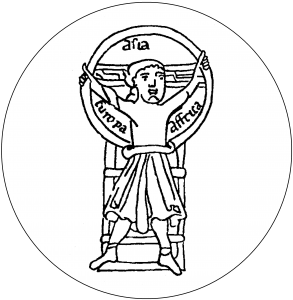11th Annual Symposium of the International Medieval Society (Paris), Charlemagne after Charlemagne
The 11th Annual Symposium of the International Medieval Society (Paris), in conjunction with the Laboratoire de médiévistique occidentale de Paris (LAMOP, Université Paris I -Panthéon-Sorbonne), will be held on the topic of „Charlemagne after Charlemagne“.
A looming presence during the Middle Ages and beyond, this Frankish king and emperor, who died in 814, had a cultural afterlife that far exceeded any other medieval historical igure. The symposium for 2014 examines the medieval reception (and representation) of Charlemagne on the 1200th anniversary of his death, as he became a model sovereign, a literary personage, and a saint. The holy emperor was venerated in a complex though limited manner, resulting in the elaboration of a distinct hagiographical discourse and the composition of a liturgical office.
The literary fortunes of Charlemagne, highlighted as early as 1865 by Gaston Paris, experienced multiple permutations. Latin and vernacular literature (French, Italian, German, English, etc.), produced divergent associations and separate developments, from historical works to chansons de geste. These literary representations went hand in hand with visual portrayals in manuscripts, stained glass, sculpture, and architecture. Charlemagne was also conjured as a figure of pilgrimage and a founder (real or imagined) of monasteries, cities, and universities, attached to these institutions through stories and forged documents to which his name was affixed. The figure of Charlemagne served to construct and define an ideal, which was shaped and reshaped by different eras according to their respective needs.
26 – 28 June 2014
Centre Malher, 9 rue Malher, F-75003 Paris
Thursday, June 26
8.45 – 9.15 Registration
9.15 – 9.45 Ouverture (Katherine Baker, Kristin Hoefener)
9.45 – 11.00 Keynote: Elizabeth A.R. Brown
11.30-13.00 Session 1: Genesis of a Literary Figure
Chair: Philippe Faure (Université d’Orléans)
Jeanette Beer, Nithard’s personal contribution to Charlemagne’s legacy Enimie Rouquette, La figure de Charlemagne dans la poésie carolingienne: de 814 à la mort de Charles le Chauve Anne Latowsky, Poésie et chronologie: la Terre sainte, l’Espagne et les vies de Charlemagne
14.00-15.30 Session 2: After Charlemagne, before Sanctity
Chair: Fanny Madeline (Paris I – LAMOP)
Richard Landes, Charlemagne, Otto III et Adémar de Chabannes: l’empereur de l’an 6000 dans la pensée de l’an Mil Matthew Gabriele, The Ghost of Charlemagne and King Philip I of Francia at the End of the Eleventh Century Claire Tignolet, Charlemagne au temps des premiers Capétiens: une figure de référence dans l’historiographie (Xe – XIIe siècles)?
16.00-17.30 Session 3: Charlemagne in Capetian France
Chair: Julian Führer (DHI Paris)
Jace Stuckey, The Memory of Charlemagne, Kingship, and the Uses of the Past in Capetian France Christopher Patrick Flynn, Speculum Caroli: The Representation of Charlemagne in the Speculum Historiale of Vincent of Beauvais Chris Jones, King and Emperor? Perceptions of Charlemagne in Later Capetian France
17.45-19.15 Visit of the Deutsches Historisches Institut, Wine
reception and IMS-Paris Prize Awards
19.30 Symposium dinner (pre-registration required)
Friday, June 27
10.00-11.00 Session 4: Views from the Outside
Chair: Amélie Sagasser (DHI Paris)
Cesare Mascitelli, Charlemagne et la Geste Francor de Venise: l’empereur aux cours de Vérone et Mantoue Vaclav Zurek, Saint patron et ancêtre: Charlemagne dans la politique
de Charles IV de Luxembourg
11.30-13.00 Session 5: Charlemagne’s Cult
Chair: Kristin Hoefener (Universität Würzburg)
Patricia Kroschwald, A reinvented tradition? The veneration of Charlemagne at Halberstadt Cathedral Eric North Rice, Charlemagne and the Consciousness of France in the Medieval Liturgy of Aachen (Aix-la-Chapelle) Joan Molina Figueras, La mémoire de Charlemagne à Gérone à la fin du Moyen Age. Culte, objets et images
14.00-15.00 Session 6: Monumental Charlemagne
Chair: Katherine Baker (INHA Paris)
Clark Maines, Charlemagne Iconography at Chartres Cathedral
Jürg Goll, La statue en stuc de Charlemagne à Müstair
16.00-18.00 Symposium visit: Basilique de Saint-Denis
Saturday, June 28
9.30-10.45 Keynote: Dominique Boutet
11.15-12.45 Session 7: Exemplary Charlemagne
Chair: Irène Fabry-Tehranchi (University of Reading)
Luke Sunderland, Charlemagne in Medieval French Chronicles: ‚les bienfaits qu’il avoit fais pesoient plus que le mal‘ Daisy Delogu, ‚comment on conquiert Dieu‘: Charlemagne as a Devotional Guide in L’Istoire le roy Charlemaine
Jade Bailey, Le Livre de Charlemaine: The Emperor Charlemagne as a Didactic Exemplar in a Late-Medieval ‚Chivalric Textbook‘
14.00-15.30 Session 8: Charlemagne in England
Phillipa Hardman, Carolingian Onomastics: Naming and Meaning in Middle English Narratives of Charlemagne
Marianne Ailes, La Chanson de Roland d’Oxford: remaniement anglo-normand?
Gernot Wieland, ‚Charlemagne‘ in Anglo-Saxon England
16.00-16.30 Julian Führer (DHI Paris): Concluding Remarks
16.30-17.00 Final discussion
Closing Cocktail

